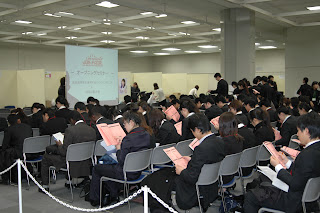Although each day brings more images of obliterated towns and villages, tales of lost loves ones, and fears of nuclear contamination - images of hope have already begun to emerge, as people across the nation come together to help the victims of the 9.0 magnitude earthquake and ensuing tsunami that literally reshaped the northeastern seaboard of Japan.
Fundraisers, young and old, stand outside of major train stations across the country, voices strained to rise above the cacophony of rush hour traffic as life goes on in unaffected parts of the country. Musical fundraising events are springing up around the country, with famous bands and DJs volunteering their services. Many companies are also stepping up and opening their wallets, including Fast-Retailing, the parent company of clothing chain Uniqlo, which will donate approximately 700 million yen worth of clothing and an additional 1.2 billion yen in monetary donations.
Of course it’s not only Japanese at the forefront of volunteer efforts. Foreign residents -teachers, army personnel and their families, as well as many others- are also joining the effort, clearing debris, handing out provisions and providing much needed support to children.
In sharp contrast to the images of survivors bravely weathering the storm in an attempt to begin rebuilding their lives as soon as possible, many international media outlets, especially those from the United States Tokyo Japan Fukushima Chernobyl
Anger towards the Japanese media and the Tokyo Electric Power Company (TEPCO) for withholding information is certainly understandable. There is no doubt that the public was late to receive information about the actual severity of the situation at the Fukushima Daiichi plant following the explosion at reactor one. However, by not revealing all of the information until they had conducted proper testing, they prevented the wide-spread panic and paranoia that swept news stations across the world. And although this may not entirely justify the delay in the release of information, it points to a fundamentally different approach to responding to disasters than the West.
As international students in Japan Japan
One way to fight the unease and depression that is bound to occur after such a devastating event is to join the fundraising and volunteer efforts. Whether it's organizing your own event, volunteering for an organization such as the Japanese Red Cross Society, offering your language skills, or simply donating money - take part in the recovery effort and give back to the country that has undoubtedly given so much to you.












